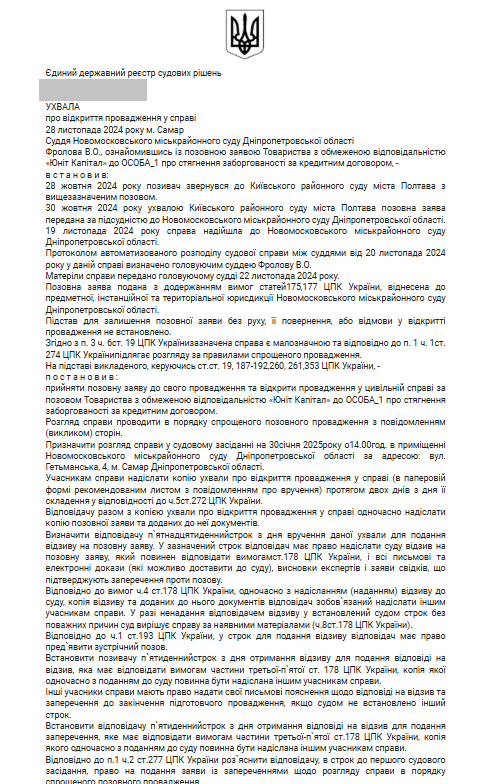Lawyer. I have been practicing law since 2017. Currently, I have my own law firm, where I am a managing partner. I mainly deal with disputes with the tax office, accompany inspections. I run enterprises from 0 and full support of economic activity. Consultations on any issues. Currently, I also have practice in military affairs.
Case Summary: Defense of an individual in a debt recovery case based on an online loan agreement allegedly signed without the client's personal involvement.
Responsible Attorney: Olha Vyacheslavivna Niemtsova
Case Background:
In autumn 2024, a client contacted our law firm after receiving a court summons. A non-banking lender had filed a claim to recover nearly UAH 30,000, allegedly owed under a loan agreement made through an online platform.
The client claimed that he had never entered into any agreement with this financial institution, had not received any funds, and had never registered in their mobile app or website. He was shocked and confused — he learned about the alleged debt only after the court proceedings had already begun.
Upon analyzing the court's ruling, we discovered that case No. 552/7410/24 was being heard under simplified proceedings — a fast-track process that often does not involve notifying the parties. This meant: without urgent action, a default judgment could be issued without the client’s input.
Initial Actions and Case Complexity:
Within a short timeframe, the attorney:
- obtained all case materials;
- analyzed the grounds presented by the claimant;
- prepared a well-argued response with detailed objections to the claims.
The key issue was that the plaintiff had only submitted screenshots from a personal account on their online service, which did not include:
- the client’s electronic signature;
- proof of funds being credited;
- an official loan agreement in paper form.
Thus, the claim relied solely on technical screenshots and statements that the client allegedly agreed to the loan online. However, there was no evidence that it was in fact our client who performed these actions.
Legal Strategy:
The attorney emphasized a key point: according to Article 11 of the Civil Code of Ukraine, obligations arise only from a valid agreement confirmed by the parties' will. The mere presence of data in a user account does not constitute proof of contract conclusion.
It was also noted that:
- the client had not signed any agreement;
- had not received any funds;
- and had not confirmed the agreement with any secure electronic signature.
The attorney clearly demonstrated that the claimant failed to prove both the transfer of funds and the identity of the person who allegedly entered into the agreement.
Outcome:
After submitting the response and additional clarifications, the court received a full picture. The claimant failed to present proper evidence to support its claims. As a result, the court dismissed the claim in full.
The client was therefore freed from the unjustified debt and did not lose a single penny over the imposed obligation.
What You Should Know:
This case is a typical example of abuse by online lenders, who rely on simplified procedures and often lack real proof of contract formation.
Court trends are increasingly favoring consumer protection, but only when a proper response is filed. If no action is taken, a default judgment may be issued in favor of the lender.
Thanks to the attorney’s swift and professional actions, the client avoided financial loss and an unfair judgment.
This case is an example that everyone has the right to defend themselves, even when a debt appears "on paper" but not in reality.
In a similar situation? Don’t wait — every day counts. Contact us — we know how to protect your rights.































